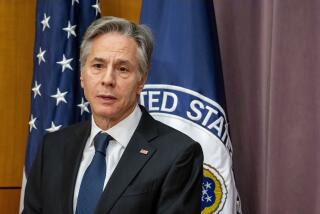Lithuania Tells U.S. It Insists on Guarantees
- Share via
WASHINGTON — Lithuanian Prime Minister Kazimiera Prunskiene told President Bush and congressional leaders Thursday that her government wants international guarantees for its sovereignty before it agrees to suspend the implementation of its declaration of independence.
Elaborating on an offer that Lithuanian President Vytautas Landsbergis made Wednesday, Prunskiene told Bush that Lithuania would consider accepting a Franco-German proposal to delay implementing its independence declaration so as to encourage the Kremlin to negotiate.
However, in a 45-minute meeting in the Oval Office and earlier in talks with congressional leaders, she said that before taking this step, her breakaway government insists on guarantees of support from the United States and other Western nations.
“We could temporarily suspend (the legislation). . . ,” she said in testimony before the Commission on Security and Cooperation in Europe, a human rights watchdog panel informally known as the Helsinki Commission.
But “in such a case,” she added, “Lithuania would have to be guaranteed, on the basis of international law, the continuity of Lithuanian independence, the continuation of her government and her territorial integrity.”
White House officials said that Prunskiene also raised the question of guarantees with Bush, who told reporters before the meeting that he supported the suspension proposal, which was first suggested by West Germany and France as a way of ending the impasse with Moscow. Prunskiene is the first high-level Lithuanian official to visit the United States since the Baltic republic declared its independence from the Soviet Union on March 11.
However, Bush, who has come under mounting congressional criticism for not taking a more forceful position in support of Lithuania, also said at a morning press conference that he sees no direct “constructive role” for the United States to play in resolving the Lithuanian crisis “at this time.”
That cautious position, which reflects a concern that more U.S. pressure at this time might undermine the already precarious position of Soviet President Mikhail S. Gorbachev, was again assailed in the Senate on Thursday. Sen. Alan J. Dixon (D-Ill.) called the Administration’s stance a “wrongheaded policy” of “kowtowing to the powerful at the expense of the weak and oppressed.”
The United States, Dixon added, “has got to do more for this little country than we are doing.”
Prunskiene, addressing the Helsinki Commission, also gently chided the United States, saying that it is “difficult for the West to perceive that pressuring Mr. Gorbachev helps rather than hinders” his reform efforts in the Soviet Union.
She argued that pressure on Gorbachev could help him resist Kremlin hard-liners who want to crush Lithuania’s claim to independence. She urged the United States and other Western countries to view “democracy in the Soviet Union and an independent Lithuania” as “compatible and converging sides of the same process, rather than alternatives.”
Prunskiene told reporters after her meeting with Bush that she was grateful for the President’s support for the Franco-German formula that offers a face-saving way to begin talks between Lithuanian and Kremlin officials.
Those talks have been held up by Moscow’s insistence that Lithuania first revoke its independence declaration and by Lithuania’s equally firm insistence, despite a Soviet economic embargo, that the Kremlin accept the republic’s right to independence before the negotiations begin.
Bush’s endorsement of both the Franco-German proposal and Lithuania’s claim to self-determination is seen in the Baltic republic “as a form of concrete assistance,” said Prunskiene, a 47-year-old economist who became prime minister a week after Lithuania declared its independence.
However, the thrust of Bush’s message to Prunskiene seemed to lie in its emphasis on what one Administration official called “the importance of dialogue” and the need for caution.
“You cannot face down the Soviet Union if they (Soviet officials) do not want to be faced down,” a senior Administration official quoted Bush as telling Prunskiene.
That was a message Prunskiene also heard from members of the Senate Foreign Relations Committee, with whom she met during a closed-door lunch on Capitol Hill.
“Everyone expressed their sympathies for Lithuania’s aspirations, but the majority also said it was important not to rock the boat too fast, that Lithuania’s hopes lay in a negotiated solution, not a confrontation with the Soviets,” a committee source said.
He added that Prunskiene “readily agreed” but indicated that she thought there was more the United States could do to “work with Gorbachev in a way that would strengthen him against the military Stalinists” who oppose his liberalizing reforms.
California Rep. Tom Lantos (D-San Mateo), a House Foreign Affairs Committee member, said that he is convinced from her arguments that Lithuania’s leaders are seriously looking for “steps, either in public or behind the scenes, that will help resolve this crisis.”
“She was very reasonable and very pragmatic,” Lantos said of Prunskiene. “She doesn’t want to be a martyr . . . and she doesn’t want to humiliate the Soviet Union. She wants a realistic solution.”
Times staff writer David Lauter contributed to this report.
More to Read
Sign up for Essential California
The most important California stories and recommendations in your inbox every morning.
You may occasionally receive promotional content from the Los Angeles Times.













